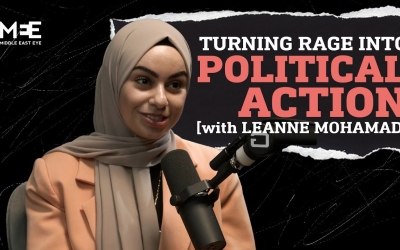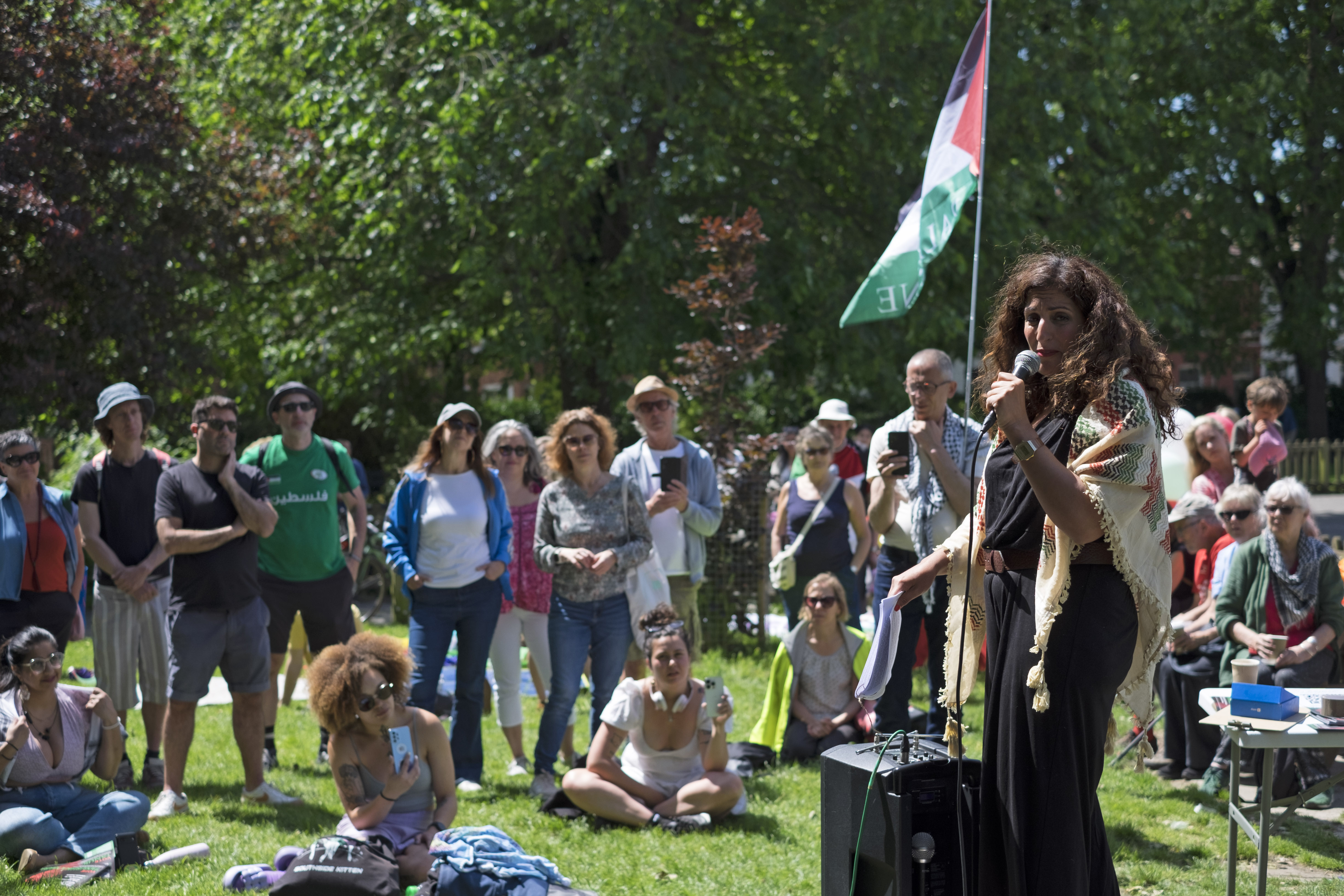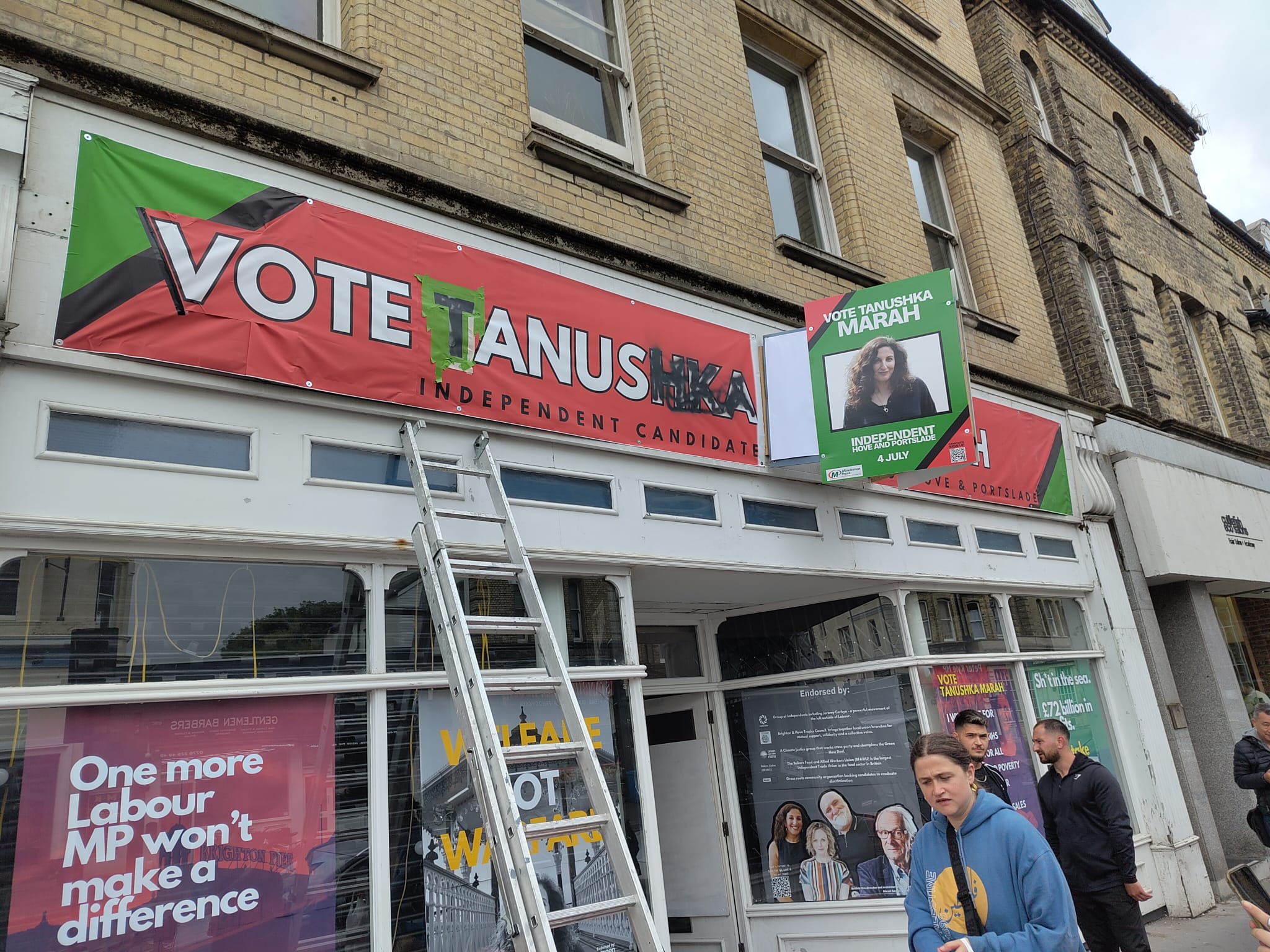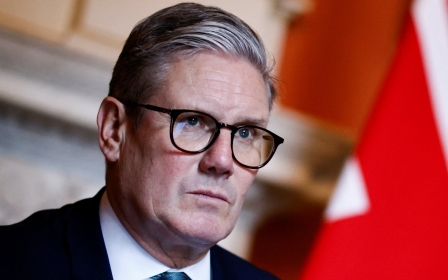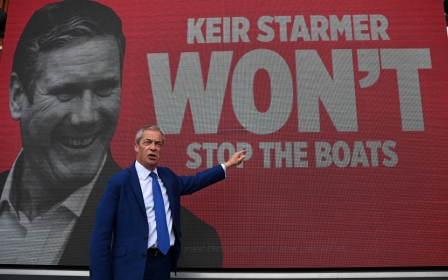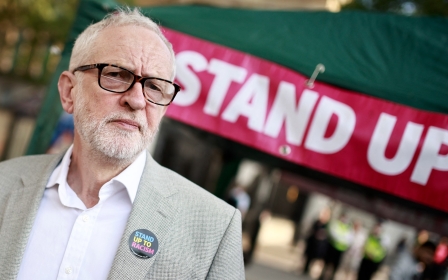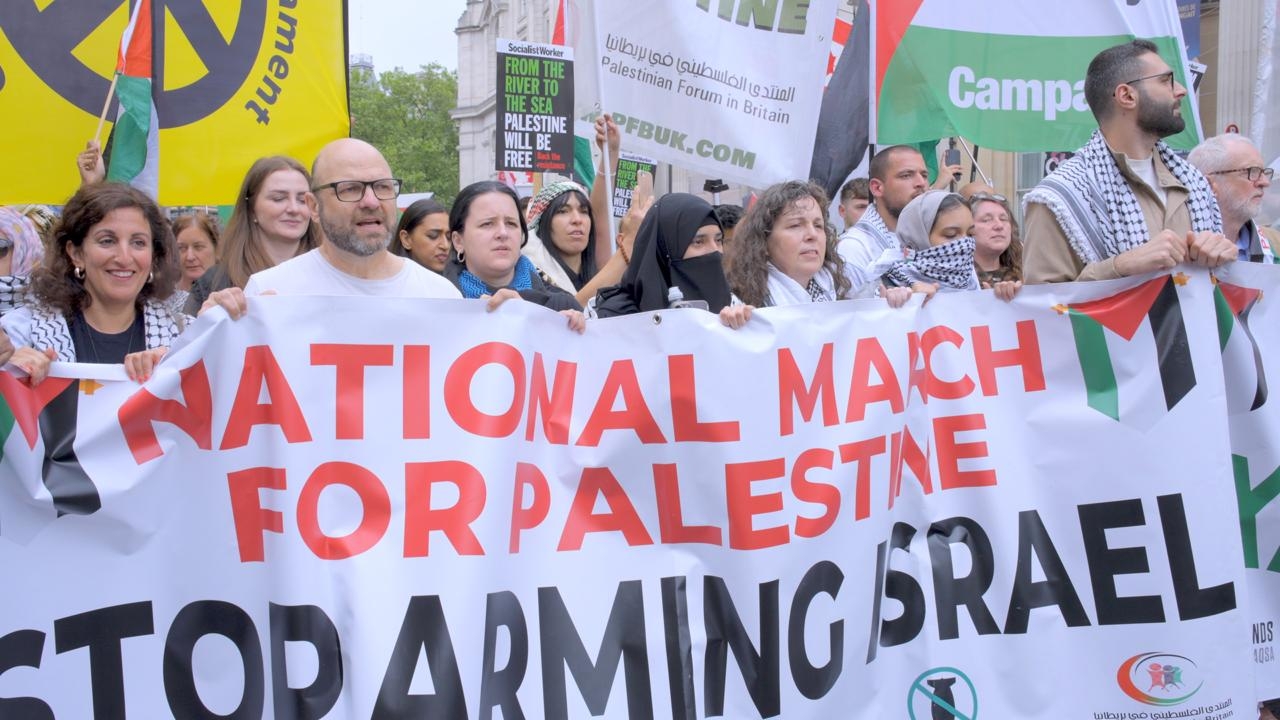
How Gaza sparked a new movement for justice in the UK
On a small self-built stage at 6am in a leisure centre in Portslade, I stand side by side with the people and politics I felt compelled to stand against in the 2024 general election. We have all put ourselves forward for the people’s vote, and now the value of our voice is measured by a number. The precise number of people I represent at this moment is 3,048. I am disappointed.
I soon learned it is a high score for a very short political campaign with no party brand or media coverage. Gaza ceasefire candidates did best in areas with major Muslim populations, where many voters felt ignored by the main parties.
Palestine was the beginning of a movement for justice and humanity that our establishment wishes would go away. It won’t. It’s just beginning
Hove and Portslade, where I stood, is a city with only a 2.2 percent Muslim population. Nationally, five independents were elected that morning and many thousands of votes went to other independents who stood for an end to Israel’s genocide, as well as to the Greens for their pro-ceasefire stance.
As I step out into the morning rain, exhausted from a relentless six weeks, I realise, with discomfort and appreciation, what Palestine has done for the British left. It is the beginning of a movement for justice and humanity that our establishment parties and media wish would go away. It won’t. It’s just beginning.
As I write this reflection, history has drawn the line sooner than we thought and it is no longer legally advisable for our government to stand against the long-overdue warrant for Netanyahu’s arrest.
New MEE newsletter: Jerusalem Dispatch
Sign up to get the latest insights and analysis on Israel-Palestine, alongside Turkey Unpacked and other MEE newsletters
A strange respect grew between some of us candidates over many hustings - the debates held during election campaigns. The Lib Dem candidate argued hard against Labour’s stance on selling weapons to Israel; while Reform’s candidate always shakes my hand as he walks past.
Both Reform and I take the voice of the people as our starting point, but Reform turns the blame on small boats, where the independent candidates are fighting the war machine which causes people to risk their lives travelling on small boats.
Even though the Greens did call for an immediate ceasefire, the reason I stood was not just relatability as a British Palestinian. Alone, our campaign foregrounded the Palestinian cause and named this as a genocide. For many of us, we are aware of the chasm in the emotional response and the option to otherise this horror and simply add it to a wish list of policies. That compartmentalised approach to Israel's actions in Gaza relegates its significance and reduces the humanity of its victims. Otherism is a building block of inequality and racism.
The Palestinian candidate
With no rosette or party name, I glimpse up at a sea of white faces and see the geopolitical landscape that is Brighton and Hove. We know our result and I feel Labour candidate Peter Kyle, who was returned with a 52 percent majority, knew his result before the election was announced, hence his distant and quiet presence during the campaign. The large Labour placards with a prominent Union Jack, which more than once I mistook for Reform’s branding, are being clutched by excitable Labour activists. The Greens are ecstatic from quadrupling their presence in Westminster.
I am the "Gaza candidate". “She is Palestinian!” our canvassers would often say (I am from Streatham, south London, I’d often remind them). “She is waving an Arab flag on a British election,” and “Go back to where you came from,” shout the haters on X. “She just wants sharia law!”
For someone whose parents did everything they could to integrate me, including losing my language and changing my name (originally Muna Shehadeh), here I was exposed as the Arab standing on a Palestinian platform. This is why it was so important that many people of different ethnicities stood on the Palestine issue. I am so happy that my Jewish comrade, son of a Holocaust survivor, intellectual heavyweight Andrew Feinstein stood in Holborn against Keir Starmer. We are not campaigning because of our ethnicity. Our identity is that we identify with the oppressed against the oppressor.
What is it to be a British Palestinian at this moment? Is it a survivor’s guilt? Is it that we relentlessly see our children in every child we see terrified, alone in pain, a limb blown off or dead? Is it that we hear our parents in the voices of grief and rage? Is it that we know, deep in our bones, the beautiful culture of Palestine, whilst our media dehumanises through contested numbers and drone shots of rubble? Implicit in every mention of terrorism when documenting scenes of horror is the idea that this ethnic group somehow deserves this hellish fate; that terrorism is somehow in the DNA of every dead, injured and displaced person.
Is it also that moment on a Sunday evening when the deadline to apply to be the anti-war and anti-austerity independent for Hove and Portslade had passed that I realised that my skill set, my ability to bring people together and my ethnicity were all pointing in one direction, and that I was needed to represent and to voice this movement.
The campaign
Gaza was forefronted as an emergency and an opportunity to give a voice to those who were horrified at the two-party complicity with a genocide. But if you are standing against oppression, then why would you not stand against homelessness, against the privatisation of our public services, against the daily destruction of our planet through greed, warfare and our cult-like subservience to the ideology of growth?
Working in theatre and having studied leadership, collaboration, participation and platforming diverse voices, I was determined to bring these skills and methods to the movement. Gone are the days when four men sit in the back of a pub and write a manifesto; the doors were open and everyone was invited to the table. That table was covered in plain paper and the fluorescent pens were out. The revolution will not be WhatsApped, and the futile hunt for an administrator and book-keeper never ends.
A carnival of ideas and creativity began, with more events being germinated than I knew were happening
I have been part of too many movements where I didn’t feel clever enough, radical enough, white enough, black enough, organised enough, working-class enough. As I stepped into the ingrained factionalism of the left, I chose to ignore it with two belligerent views: that we must unite and everyone is welcome.
Our process was to create welcoming spaces where working groups were built organically through open public meetings. From this emerged a core group that enabled independent projects and actions. Everyone grew into their position. No one was appointed from a ruling body. Inclusivity and localised experience were at the core of everything we did. If we had arrived at the first meeting with a bag of policies and a board of advisers, who would feel any urgency to make our movement matter?
A carnival of ideas and creativity began, with more events being germinated than I knew were happening. People joined us and organised music festivals, literary nights, community events, garden parties, cake raffles, you name it. Bureaucracy strangles, centralisation strangles; by contrast, letting people take the initiative, creating an inclusive, open culture brings more people on board and creates a movement that people from all walks of life want to be part of.
We operated from a place of blazing optimism and fun. Why would any of us bother to fight the huge battle that we were always likely to lose? That is why I judge this experience on the process of the campaign, which, very similar to theatre, demands a huge team belief and effort and vanishes the moment it finishes. “We are such stuff as dreams are made on,” says Prospero in Shakespeare’s Tempest.
Everything was a collaboration, including my speeches. This was a team effort and collaboration that the best-paid consultants could only dream about. And what we were united on gave us unfaltering energy for singular goals: that was an end to the genocide and funding of wars, an end to endless austerity; and real action on our climate. At times I felt I understood the religious zest of a missionary.
Campaign managers with decades of experience and people completely new to politics canvassed together. I met people I would never have known before this movement and, as it grew, it brought together a diverse mix of ages, backgrounds, skills and experience. I come from a family of non-voters, yet my parents were very well versed in history. The campaign brought in people who looked like my parents, aunts and uncles, alongside trade unionists, ex-Labour activists, the LGBTQ+ community and young people.
With the generous donation of a shop in central Hove for the last part of the campaign, communities were built, friendships were made, food was shared, passersby would come and ask questions; we were in the world and off our phones, we were all carried by the undercurrents of this movement that had been built with care, hard work and trust.
With a media blackout on all the independents, with no party branding or machinery behind us, we fought for every one of those 3,048 votes.
What has Palestine done for British politics?
Since last October, many of us have grieved and raged privately as we witness a genocide in real time and know full well our country’s complicity in this mass murder. Many of us could not shout at the radio any more; we needed to get on our feet and feel we were doing something together. We marched, we occupied public space, we raised our voices and new leaders emerged.
By the time the general election was called, Palestine could not be ignored, compelling many new people like myself to stand. The words “ceasefire candidate” were part of the 2024 election discourse. Those who wave the Palestinian flag are not only waving the flag of a country and a people but they are also waving the flag of liberation, justice and equality for everyone. That is what it means when we say none of us are free until Palestine is free.
Palestine, in all its blatant horror and injustice, gave us the path to a united front, to inclusivity and a new form of comradery which acknowledged diversity without ever needing to name it. The road to fascism is being paved daily and we urgently need to put some of our differences aside, unite on what we agree on and stand shoulder to shoulder against injustice. As one Iranian woman said to me very simply, “We can’t afford to be fussy”.
Harassment
There is no point in avoiding the people who want to destroy you; you may as well put your energy into representing and highlighting the people who are being destroyed. We knew the harassment would come and it came in tandem with the visibility and success of our campaign.
As the online campaign against me grew in intensity, and the surveillance of our events became apparent, a point was reached where we didn’t know what shock we would be facing each day.
Hungry for proof to discredit me, a six-second clip was recorded from a hustings and then circulated online. I was accused of describing 7 October as a “reaction”. My full sentence included the words: “October 7th was a massacre and my heart goes out to every innocent life lost”. I then continued to say that if you dehumanise people, keep people in an open prison and bomb them every year or two, there will be reactions. Regarding the word “reaction”, we have had to endure the word “response” as a euphemism for Israel’s relentless assault and mass murder since 7 October.
Our current prime minister believed that food, water and electricity being turned off was a legitimate response. Please someone explain to me what is the proportionate use of mass starvation, bombing and torture of an ethnic group? I stand by my words: all violence is an action or reaction; it simply depends from which point in history you start from. We should rightly start in 1948. Calling something a reaction is not making a value judgement or justifying attacks on civilians, it is simply acknowledging how peace can never be achieved through apartheid and war.
Most of the hate and racism online I ignored; it felt like my X account had lice which were multiplying and I would treat them when I had time. If anything it proved my point that old-fashioned racism was as alive and kicking as it was in the 1970s.
A week before the Jewish hustings, my invitation was publicly rescinded for my anti-Zionist views, with the organisers claiming they did not want to give my “hate” a platform. Fortunately, the Brighton coalition movement and my own allyships are so integrated with Jewish ceasefire groups that many, including Jewish Voice for Labour, came to my defence, releasing statements of support and questioning the validity of this exclusion.
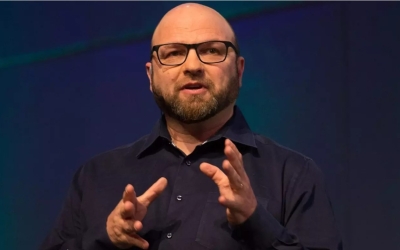
From this point, the harassment intensified: our campaign headquarters were vandalised, the padlock on our office was glued, and then another banner was defaced. Our campaigners were criticised for standing anywhere within a 400-metre radius of a hostage memorial; some were filmed and harassed as they stood at a bus stop or were out leafleting. Our flyers and posters appeared in areas where no one had been advised to put them like in the kosher section of Tesco. These were then photographed and shared all over social media as proof of our indelible hatred.
The bullying felt real. One day, a line of people, mostly men, formed outside a women of colour literary event for our campaign. I saw my name on a placard held by a man, and saw the words “rape is not a reaction” and “necrophilia is not a reaction”, and the list continued. I was shaken by this: to see a line of white people dressed in black was immediately reminiscent of the British National Party in the late 80s.
I didn’t feel in danger from the organisers of the campaign of hate; I felt endangered by the rogue individuals who could take matters into their own hands. I thought of Jo Cox and how racist rhetoric can appeal to the most unstable and dangerous among us.
The day 274 Palestinian lives were brutally extinguished in a rescue mission to release four hostages, we heard David Lammy, who is now the foreign secretary, call this massacre “a moment of light in the darkness”. When did politicians become so morally illiterate that they no longer question the idea of the means justifying the end? When did we see the exchange rate of human life so racially weighted?
Many who have publicly worn their solidarity with the Palestinian people are discredited for sharing a platform or liking a tweet, whereas the enablers and sympathisers of genocide continue to use wildly inflammatory language.
Decades of dehumanisation have led to a genocide which many see as an issue which should not concern the British public. Those of us who have put our lives on hold to stand up against this have been told we are making politicians unsafe and making Jewish people unsafe. Why is the safety of those who condone aggression so much more important than those who oppose it? Why was my safety of no interest to the national press until after the election?
Colonialism is based on the tenet that the occupiers have more worth and value than those they occupy, that the Jewish right to a homeland is more important than the Palestinian right to theirs. Through our calm and logical tradition of western philosophy, we mistrust the emotive reaction. A logical transactional lens is given legitimacy and used to condemn the emotional and deeply moral reaction of opposing the horror that is happening to our fellow human beings.
A new politics
People like to say Palestine is an “over there” issue, but the moral battlefield is here, and Israel is losing that battle. We cannot trust those in power to make decisions on our children’s lives when they remain silent about the deaths of 20,000 of the “wrong” kind of children. We cannot trust those in power who tell us we can’t afford to reduce child poverty and fund our basic needs, whilst they increase military spending by billions.
We have just seen Roger Hallam, who was helping to launch a new model of democracy based on people’s assemblies, and working with many independents like myself, given a draconian sentence of five years for attending a Zoom meeting about a protest. He is now jailed along with four other climate campaigners following a Kafkaesque trial that resembled the kind you read about in dictatorships. Yet these five are part of a wider movement that questions the dysfunction of our archaic democracy, that sees a new democracy of the people as a real alternative.
Gaza and the moral vacuum it has revealed in western leadership has opened up a crack in our political system. We must prise it open
Candidates like me emerged from the pro-Palestine movement. My fellow independents have defied the political establishment and entered parliament; and the campaign from Labour’s sore losers and the right-wing media to discredit them has begun.
Many of us were awoken by the Corbyn era; we witnessed his decimation by the British press and his own party. (He’s now back in parliament as an independent.) We armed ourselves with theoretical distinctions, including those separating antisemitism and anti-Zionism. Jewish allyship grew more visible and pronounced than ever, and many new leaders were born in this movement.
Over the coming months, the Gaza-inspired political awakening will need to reimagine itself as a more permanent people’s opposition movement. We must tighten our helmet strings to face the surge of the far right, which Keir Starmer’s centrism and politics as usual will only enable to grow. The stakes could not be higher.
Gaza and the moral vacuum it has revealed in western leadership has opened up a crack in our political system. We must prise it open.
The views expressed in this article belong to the author and do not necessarily reflect the editorial policy of Middle East Eye.
Middle East Eye delivers independent and unrivalled coverage and analysis of the Middle East, North Africa and beyond. To learn more about republishing this content and the associated fees, please fill out this form. More about MEE can be found here.


